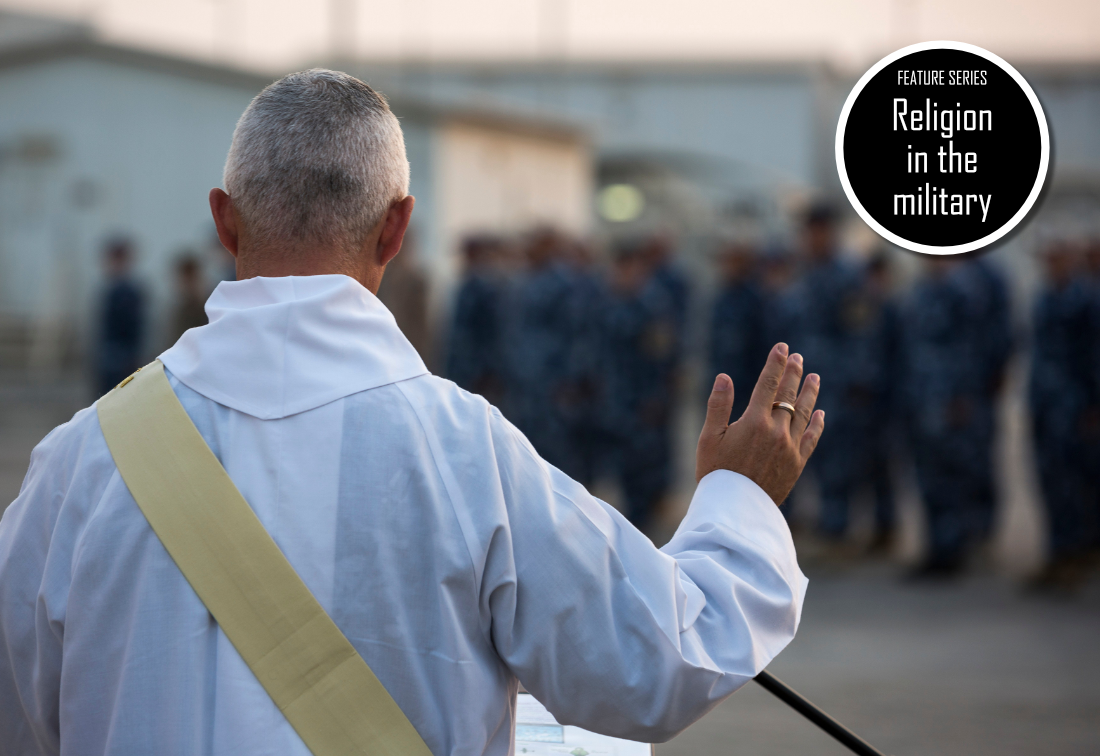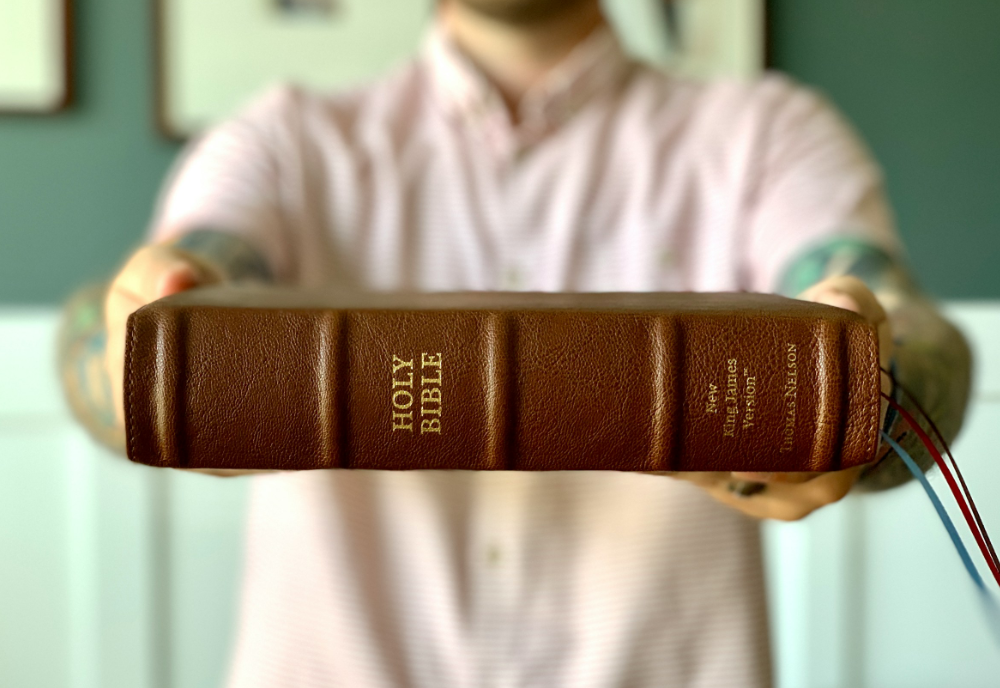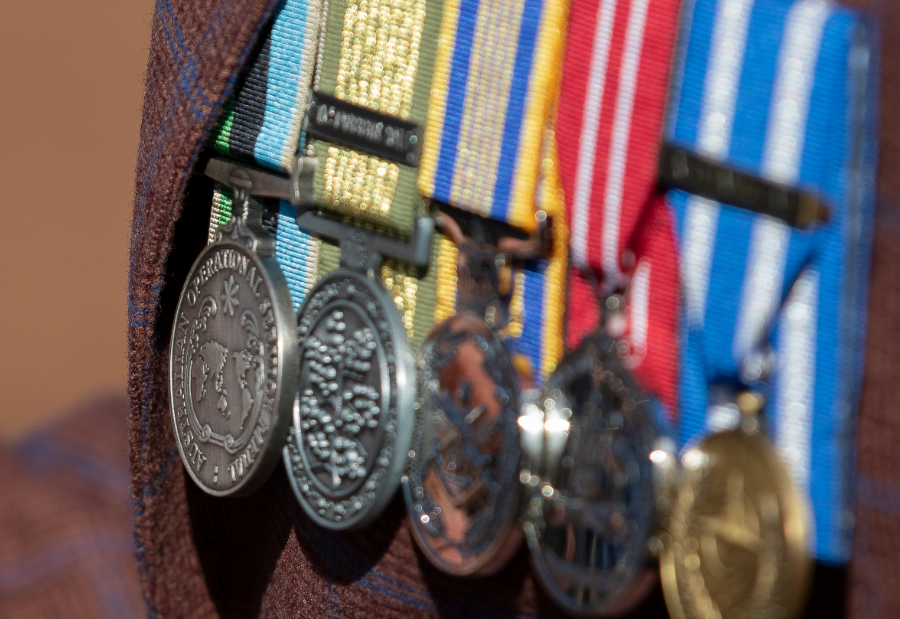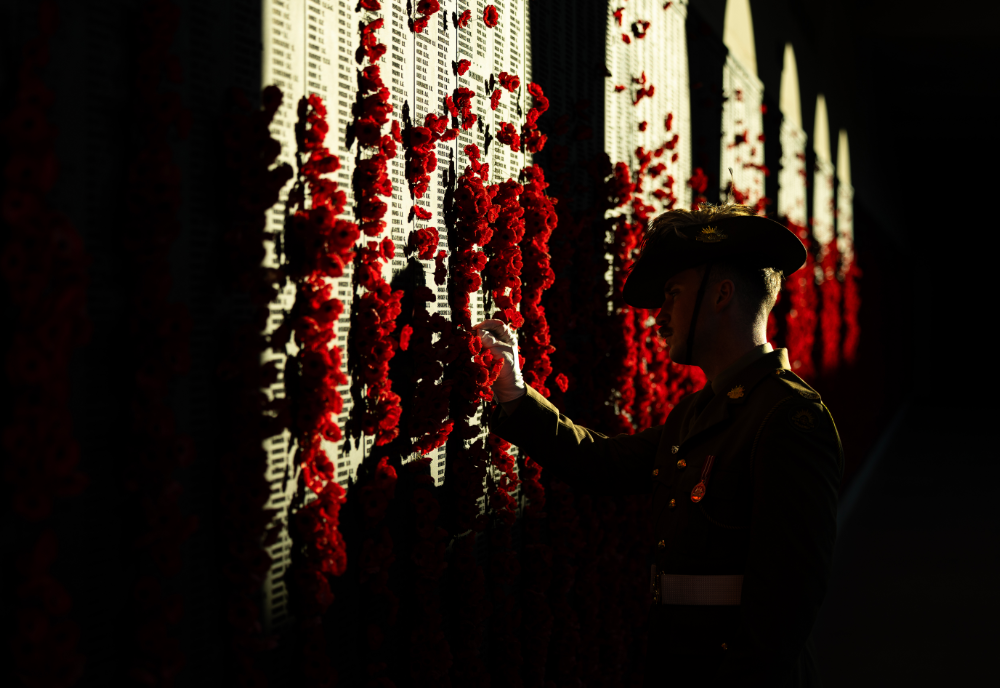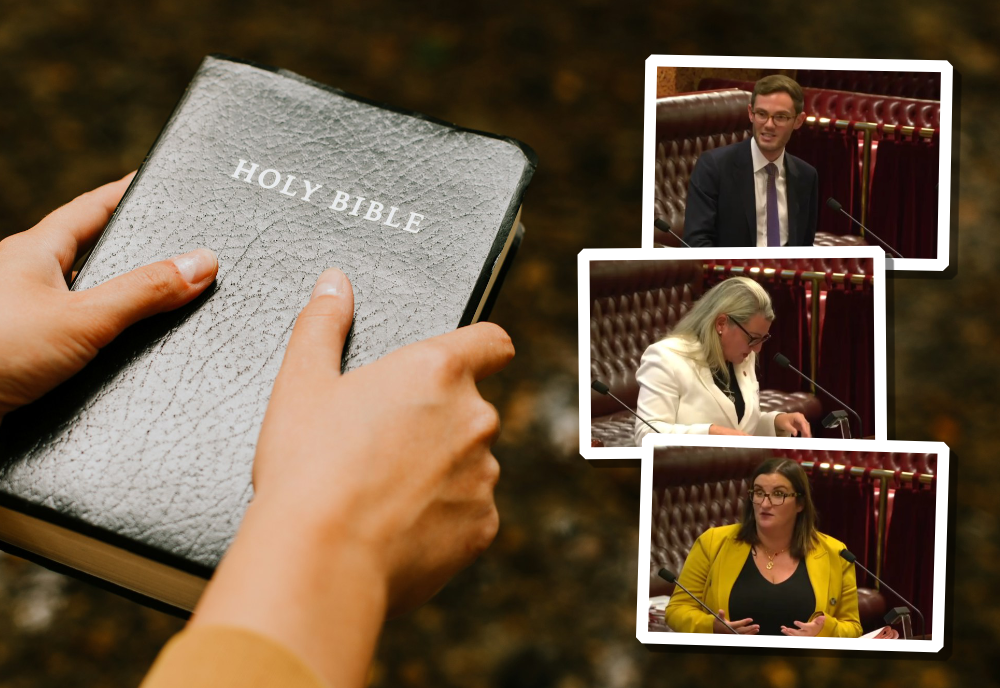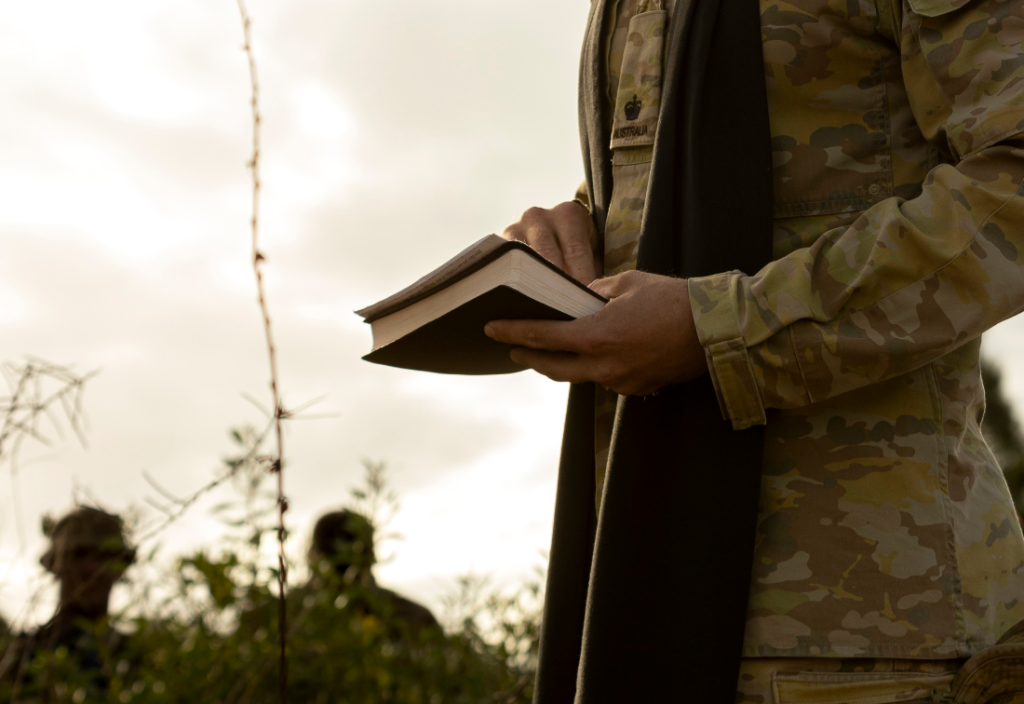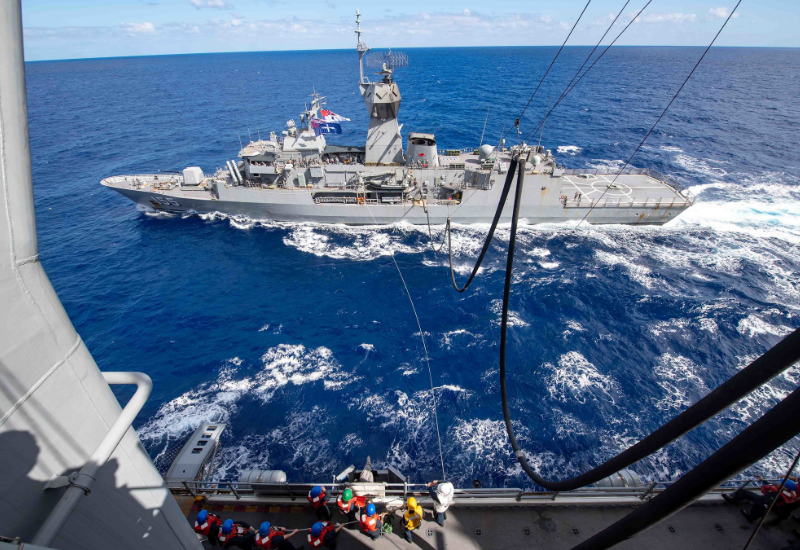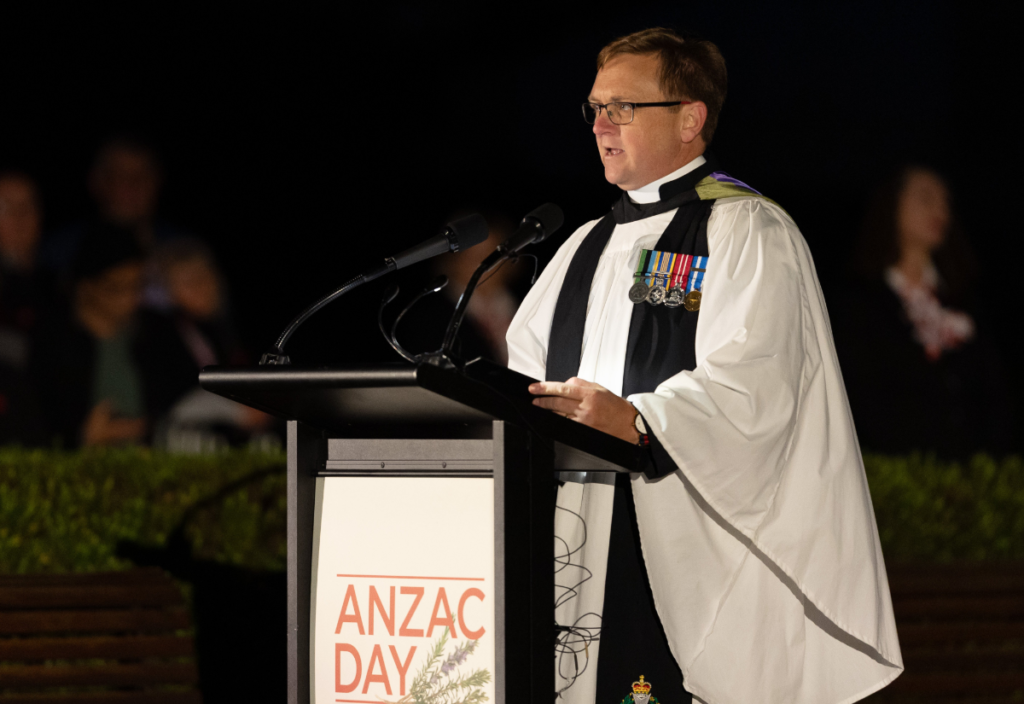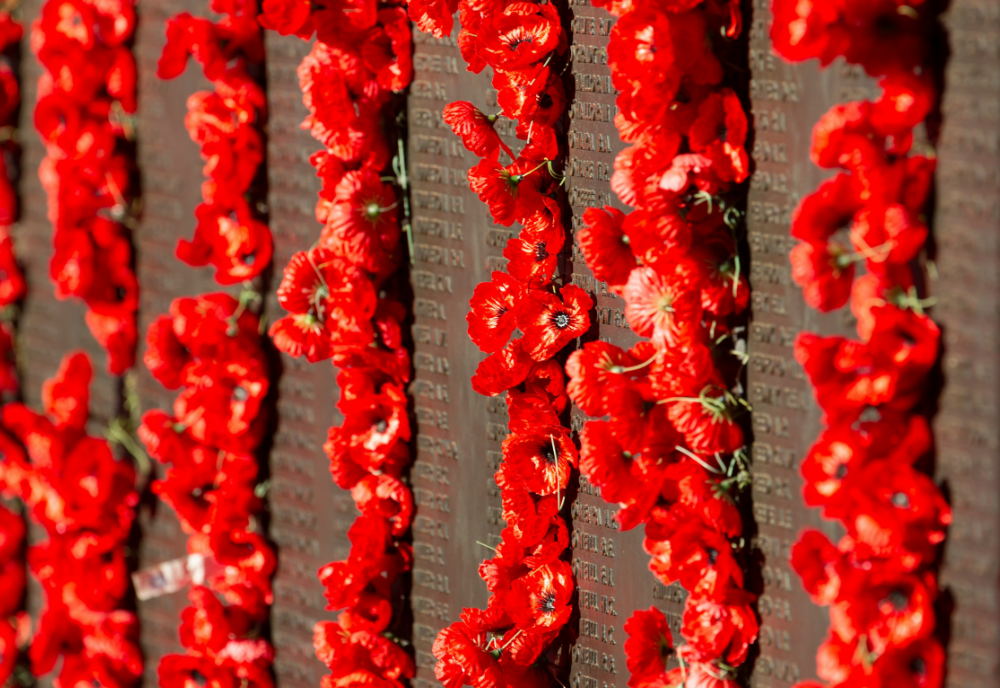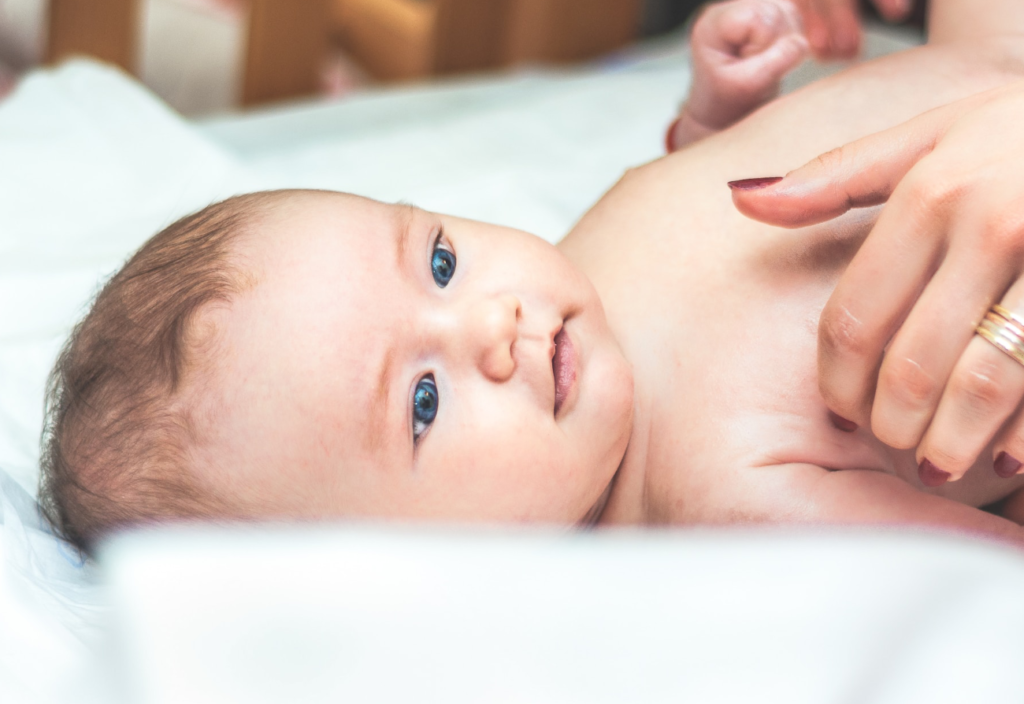This article is the second in a series on religion in the Australian Defence Force. Read the first article here.
During the Great War, chaplains serving alongside Australian infantrymen were surprised to find non-religious men were capable of performing good and even heroic acts. “Since most chaplains believed that religion provided the only basis for the exercise of the virtues, they needed to reconcile these apparently contradictory facets of character. Some chaplains implied that if a man was virtuous he was necessarily religious,” wrote Michael McKernan in his book Australian Churches at War.
Upon returning home, chaplains were often asked whether men became more religious under fire. McKernan noted that some chaplains witnessed a lack of interest in religion among most soldiers. Asked if there was any truth to the claim that there were ‘no atheists in foxholes’, C.O.L. Riley reported he had seen no evidence of mass conversion.
In today’s Defence Force, there are more atheists in foxholes than ever, with still no sign of mass conversions. The religious demographics within Defence have dramatically changed since the early part of the 20th century, with official figures now showing the non-religious make up the majority of service personnel.
Some things, however, haven’t changed. Defence continues to rely on clergy – also known as ‘padres’ and ‘chaplains’ – to provide frontline pastoral care and wellbeing support for personnel in Navy, Army and Air Force. And some chaplains continue to believe that God is required for service personnel to effectively deal with the stresses of war.
Australian taxpayers are, in effect, funding a religious mission as the primary mode of care in a government institution experiencing a mental health crisis among its workers – a crisis that has witnessed “alarming” suicide rates and that is the subject of an ongoing royal commission.
With questions now being asked about the appropriateness of Defence’s reliance on religious clergy as the frontline support capability for service men and women, this article, published as part of a Rationale series on religion in the military, provides insights into the religious capability in question.
A review of public remarks by chaplains in promotional materials and official Defence publications, such as the Australian Army Chaplaincy Journal, raises further doubts that the Defence Force’s chaplaincy capability can effectively meet the needs of Defence personnel, especially those with no religion.
Many chaplains, no doubt, have the best interests of service personnel in mind and do exceptional work in caring for them. However, this article reveals attitudes and views among the Defence chaplaincy branches – many aired in official channels, no less – that seem incompatible with delivering appropriate care and at odds with not only Defence values but wider societal values.
Defence chaplaincy is unmistakably a religious capability. The vast majority of chaplains are Christians, trained in theology and experienced in church life. Only a handful are from other faiths – and, thanks to Navy’s reform in 2020, now a small number provide non-religious support.
Notably, the theme that chaplains are “serving two masters” appears to be common. In an official video promoting Army chaplaincy, one chaplain says: “I know it’s a call to serve God by serving our soldiers. It’s an unconditional commitment in both ways – to Him and to them.” Last year, Army Chaplain Renton McRae wrote that he remained accountable to both the church that had endorsed him and to his commanding officer. He said:
The tension of serving two masters is another paradox governed by moral conscience and the mutually exclusive, ‘Render unto Caesar the things that are Caesar’s, and unto God the things that are God’s’.
Despite efforts of Defence to become more inclusive of minority faiths in recent years, including in its Navy, Army and Air Force chaplaincy branches, some chaplains clearly view their role as one in Christian missionary. In describing its current culture as part of a 2018 Military Appreciation Process – a process normally used during planning for military operations – Army’s chaplaincy branch spoke of the “unique opportunity to serve the Master” and point people to hope that could “only be found through faith in Jesus”.
Similar sentiments are repeated in a newly released promotional video for Defence Anglicans by a chaplain who argues that chaplains provide personnel with the “peace, hope and calm that only comes from a relationship with Jesus”. In the video, new Chief of the Defence Force Angus Campbell makes a star appearance.
Being uniformed, embedded alongside service personnel in ships and units, and present in high numbers – currently, there are more than 300 full-time and part-time clergy in Defence – chaplains are the most accessible and readily available support for personnel. Other professional secular support, in the form of psychologists or social workers, are civilian, external to daily life in ships and units, far fewer in number, and more difficult to access in a timely fashion.
Chaplains have access to all members and commanders on a daily basis. According to Army Chaplain McRae, the freedom of movement empowers chaplains “to be the most mobile person in any establishment.” Given the suspicion towards outsiders who do not have the shared experience – a phenomenon in military subculture as described by ‘Chaplain Dave’ in 2013 – personnel have limited options for seeking support. That is especially the case if they want in-person support after-hours or on weekends.
The primary functions of the chaplaincy role are religious ministry – including activities such as worship services, religious instruction, baptisms, weddings and funerals – and pastoral care. Another major part of the role is supporting commanding officers and providing them with moral guidance. As ‘Chaplain David’ noted in 2013, chaplains have, historically, helped command to reflect on the moral and ethical dimension of various courses of action.
The three services – Navy, Army and Air Force – have also traditionally devolved responsibility to chaplains for educating and training in the areas of ‘character’ formation and moral leadership. As former Army Colonel Phillip Hoglin noted earlier this year, Christian concepts of character still permeate Army’s standing doctrine on character. “The existing doctrine … is an offensive and confusing amalgam of thought that wastes no time invoking a view that value in humanity has origins in a Christian belief in God. The same document perpetuates the notion of character and religion being intrinsically linked,” he wrote.
Such doctrine is indicative of how the institution remains stuck in a different time, with overt and inappropriate Christian influence continuing to shape an ‘ideal’ view of those who serve. Indeed, Defence’s character instruction emerged in the 1950s to become, according to Michael Gladwin, a “crucial component of chaplains’ ministry”. It was derived from materials including a Catholic layman’s book on the Ten Commandments, he said.
Writing of the character doctrine in 2014, Colonel Craig Bicknell said it recognised “faith in Christ” as a “valuable component of fighting power” and the “profound claim” that such spiritual and moral qualities were as important to Army’s combat capability as physical fitness and skills.
Unsurprisingly, the belief that our service men and women need God, especially in the heat of battle, seems to remain prevalent in Defence today. In 2013, then Principal Chaplain for the Army, Geoffrey Webb, argued there was a “deep-seated awareness” that chaplains played an essential role, even when there was an “absence of religious fervour” among personnel. Having a sense of a transcendent purpose in the confronting of evil, he said, would go far in “ensuring the maintenance of the humanity of those engaged in this confrontation”.
Many examples of similar sentiments can be found online. In 2012, Army Chaplain John Sanderson told ABC Radio that soldiers with a faith background were able to “recognise the humanity” in the people that they meet in conflict zones. “As a consequence, they can relate to them on a human level and see them as human beings. They don’t see them necessarily as an enemy or some other descriptive term. They recognise the humanity that’s equal to theirs.”
In 2018, the Army’s Senior Staff Chaplain, Presbyterian Chaplain Martin de Pyle, wrote that non-religious people suffered from “self-deceiving” for choosing “not to believe in God and His plan to restore the Divine-human relationship”. As a result, there are contradictions in their judgements and inconsistencies in their decisions, he said. Christians, on the other hand, he argued, have the “advantage” of access to God’s special revelation – the Bible – through which people can “live in community knowing that they should not murder, lie or steal.”
Such attitudes towards non-religious personnel appear at odds with the Defence Force’s own core values, which includes respect for others. While chaplains use a motto ‘Positioned to serve’, such beliefs surely raise doubts about whether a religious-based capability can effectively meet the needs of all personnel, especially the non-religious majority.
Such doubts informed Navy’s decision to introduce some secular roles to its chaplaincy branch in 2020 after evidence given to the Defence Force Remuneration Tribunal identified numerous barriers to personnel seeking help from religious chaplains. For example, Navy’s Captain S. Bowater, Commander Shore Force, said that, without a “neutral” pastoral carer, some people would not seek help from religious chaplains. As a result, they “may be troubled and unable to focus on their roles and responsibilities as we need them to do”.
No great leap of imagination is required when considering some of the reasons that personnel – especially new recruits, among whom 80 per cent identify as not religious – may not want to speak to clergy about their problems. Survey data published in 2020 by Dynata confirm the reluctance of non-religious people to seek help from religious chaplains in institutions such as hospitals and the military. Of more than 1,000 respondents, only 22 per cent of non-religious people said they would be likely to seek support from religious chaplains, whereas 49 per cent said they would seek non-religious pastoral support.
In the public comments of chaplains, there’s evidence of some recognising limitations in being able to serve the needs of all personnel. In 2017, Army Chaplain Stephen Brooks wrote that he “couldn’t be everything to everyone” while serving in Afghanistan. “I was very conscious of my strengths and limitations of ministering in a pluralistic setting, in which few publicly acknowledged denomination and faith group affiliations, whilst most remained silent and distant from all things religious.”
In a promotional video for Air Force chaplaincy, Chaplain Tom Killingbeck says some people do not want to seek help from chaplains. “There are people who would not want to come and see a chaplain. But, for the most part, we’re here to help, and people recognise that.”
There is evidence, too, that some believe chaplains remain well-placed to tend to the spiritual and pastoral needs of non-religious personnel. Navy Catholic padre Anthony Crook told a Catholic media outlet that chaplaincy brings a “language and understanding of theology” that can help people “discover meaning in suffering and other deep existential questions of life” – a sense of meaning, he added, that the “great secular narrative” doesn’t provide a response for.
Many service personnel no doubt worry about whether their assigned chaplain holds dogmatic religious views on issues including sexuality, abortion rights or social issues such as same-sex marriage and voluntary assisted dying – issues that they may be grappling with in their private lives.
In 2017, Army Chaplain Gary Pope wrote that Army personnel were suffering negative effects of the “widely practiced and culturally endorsed inauthentic expressions of sexuality.” He argued that sex in any form outside of God’s “intended blessing” – marriage between a man and woman – was “bereft of the fullness it could have” and was “often quite harmful”. He said:
To ensure the goodness of human sexuality is experienced as Divine-intended blessing, God provides the perfect context for sex: the covenantal relationship of marriage, wherein man and woman become ‘one flesh’.
Chaplain Pope also questioned Defence policies on healthy relationships and sexual ethics because they encouraged, among other things, premarital cohabitation.
The religious-based nature of the capability opens the door, of course, to chaplains identifying problems as ‘sin’ and the solutions as requiring ‘repentance’. Last year, Chaplain Matthew Stuart advocated that people who behave in contradiction to Defence values should be viewed as “having sinned”, and suggested activities to help individuals and teams find “redemption from sin”.
In 2018, Chaplain de Pyle wrote that any attempt to deal with guilt and shame outside the Christian framework was deficient. “Secular psychology often simply attempts to remove guilt by removing responsibility. This approach will thereby misclassify what is really a sin problem… Psychological methodologies of acceptance are cheap substitutes for forgiveness that deny the need for an existential experience of Christ’s atonement.”
Defence chaplains have positioned themselves as the professionals to treat ‘moral injury’. Defence’s Mental Health & Wellbeing Strategy 2018-2023 identified moral injury as an “emerging concept” relating to non-physical wounds, with potentially multiple “bio-psycho-social and spiritual consequences” for health and wellbeing. As Chaplain Stuart noted in 2018, research on moral injury “seems to echo a constant in the presence of Shame, Guilt and the importance of Forgiveness in the healing process”. It wasn’t lost on him that this reflected the Christian paradigm. As such, Defence had a responsibility to provide members with the ability to be “aware of the dents in their soul”.
Last year, Christian media outlet Eternity News reported that Defence was about to roll out a new program to treat moral injury. As part of this, Army Chaplain Phil Riley said chaplains had been undergoing training in ‘pastoral narrative discourse’ aimed at helping individuals share about the event or series of events that caused them to experience moral injury. “It’s based on the confession, essentially,” he said. According to him, the need to develop spiritual fitness and build “robustness around life’s big questions” among personnel was particularly acute among young personnel who lacked the Judeo-Christian framework of previous generations.
The need to address moral injury appears to have backing at the highest levels in Defence. In a recently released promotional video, the Chief of the Defence Force Campbell praises chaplains for their work in nurturing character, moral strength and resilience. “We need chaplains to stand with them [personnel] in their darkest moments, to provide pastoral care and to help them heal the moral injury and spiritual wounds that service can inflict,” he says.
Documents obtained via a Freedom of Information request by the Rationalist Society of Australia, publisher of Rationale, suggest that some parts of Defence are not convinced about the effectiveness of religious-based chaplaincy. The documents of meeting minutes for the Religious Advisory Committee to the Services (RACS) reveal that the Defence People Group made a submission to the Royal Commission into Defence Members and Veterans Suicide that was “underwhelming in terms of the chaplaincy contribution to mental health and welfare.”
Navy’s former head chaplain Collin Acton is leading the call for Defence to reform its model of religious-based chaplaincy, arguing that theology degrees and experience in church life do little to prepare chaplains to deal with the issues facing personnel in the modern Defence Force. If Defence were starting out today and designing a pastoral care and wellbeing support model, he has argued, it would be inconceivable to think it would design a system based around religious clergy.
Evidence has shown that chaplains spend very little time attending to religious matters. In 2020, when he advocated for the introduction of non-religious personnel to his chaplaincy branch at Navy, Acton pointed out that the ‘Chaplaincy Reporting Tool’, used to monitor the work of chaplains, revealed chaplains spend 95 per cent of their time dealing with non-religious matters – issues, for example, of family breakdown and relationship problems.
At least one former RACS member has shown foresight on the inevitability that Defence would need to reform its chaplaincy model. Writing in the Australian Army Chaplaincy Journal in 2013, Reverend Professor Allan Harman argued that, with the rapid rise of people professing no religion, there could be no legal compulsion to maintain the Chistian position in Defence.
To take the opposite position would be an attempt to perpetuate the myth that we live in a Christian country. People can’t be forced by legislation to adhere to Christian beliefs or moral standards… We need to prepare for the greater impact of non-Christians in Defence who will wish to assert their rights… At some time in the future we will have other non-Christian chaplains in addition to the small number of Jewish chaplains we already have. We need to prepare for this introduction of non-Christian chaplains.
Almost 10 years later, only the Navy has taken steps to reform its chaplaincy branch to include some non-religious chaplains. When the Defence Force Remuneration Tribunal approved the introduction of secular wellbeing officers in Navy, a footnote in the ‘Decision document’ said that, while Army and Air Force were supportive of the proposal, they “do not intend to make any changes to their respective Chaplaincy workforces.”
When the Army established its chaplaincy capability in 1913, as Chaplain Martin A Johnson noted, the heightened concern for impartiality on religious matters at that time ensured the chaplains employed reflected the denomination mix of society, as taken from the 1911 Census. As a starting point, perhaps today’s Defence Force should turn to the latest Census results, and Defence’s own Census, in developing a pastoral care and wellbeing capability to better meet the needs of its workforce.
Surely, anything that gets in the way of supporting the mental health and wellbeing of our service personnel – be it religious missions, other masters, outdated views on character or sexuality – is an unnecessary roadblock to them, and our Defence Force, being the best they can be.
If you wish to republish this original article, please attribute to Rationale. Click here to find out more about republishing under Creative Commons.
Photo by Department of Defence (Commonwealth of Australia).

